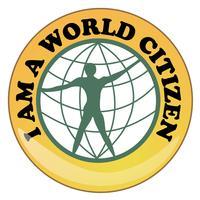GE- A1
Global Citizenship
Title: Global Citizenship. By: Bullard, Eric, Salem Press Encyclopedia, January, 2016
Last reviewed: April 2016
Global citizenship is a term used to describe the promotion of a global-centric manner of thinking in which people consider themselves to be citizens of the world rather than of individual nations. Although the term can have many connotations, it is perhaps used most often in conjunction with a broad concept of global advocacy in which a person identifies with an international community of like-minded individuals seeking to improve the world. In this context, the term is meant to convey a philosophical belief rooted in being globally minded—that is, to be culturally aware and respectful of people from all backgrounds—while making positive contributions to the welfare of the planet. However, it may also have a broader meaning in which people simply recognize and understand the increasing interconnectedness of people around the world.


Definition
Global citizenship is a term that is usually associated with people seeking to make positive changes in the world. The term is fixed in the belief that citizenship as a concept comes with a set of necessary duties. As all people are "citizens" of Earth, every person is therefore required to fulfill his or her requisite obligations to it. However, the definition and resulting requirements of citizenship may vary from person to person.
Nigel Dower and John Williams in their book Global Citizenship: A Critical Introduction argue that global citizenship can be broken down into ethical and citizen components. The ethical aspect of global citizenship asks that people consider the proper stewardship of Earth and its many residents. The obligations required from this component of global citizenship may be fulfilled through activism intended to bring about a better, more cooperative existence for everyone. It is in this role that global citizenship is most often considered.
Dower and Williams define the other component of global citizenship—that of citizen—akin to being a citizen of a traditional nation. This aspect is more concerned with establishing a collective foundation such as those grounded in the laws and constitutions of nations. While Dower and Williams suggest that there are aspects of these systems in global organizations such as the United Nations, international charities, multinational corporations, and nongovernmental organizations (NGOs), no true global governing body exists, thereby bringing into question the feasibility of becoming an actual global citizen. Instead, people will ultimately be ruled by the government of the nation in which they live. In addition, the movements of people for economic, social, or humanitarian reasons remains limited. National boundaries remain fixed, thereby limiting the ability of people to truly live and travel as global citizens.
The definition of global citizenship remains ambiguous, however, and sometimes is merely intended to promote a more multicultural worldview with regard to education, travel, or culture. Additionally, the field of global studies is dedicated to exploring how the increasing globalization of the world affects the political, economic, environmental, and social relationships between various cultures. The role of global citizenship is often an important component of these studies.
Objectives of Global Citizenship
Many people identifying as global citizens view themselves as both citizens of the world and their native country. By professing their interest in creating a global community, they are not disavowing their own cultural or national identity. Rather, they believe that many of the world’s problems cannot be resolved through the efforts of a single government. They require action from a plurality of committed nations willing to make a difference without regard to national boundaries.
Many aspects of the global citizenship movement are rooted in sustainability and improving the welfare of its most vulnerable people. This movement uses values-based advocacy that is oriented toward improving the civil, environmental, and political rights of all people.
The idea of global citizenship seeks to promote the belief in the interconnectedness of people in an era where technology has reduced the physical boundaries separating them. This globalization of contemporary society has highlighted the interdependency of all people, despite the nationalist impulses that often drive political action. The fundamental principles underlying global citizenship, however, do not advocate for an end to national boundaries but rather for a starting point of cooperation. Adopting a worldview that acknowledges these growing connections between all peoples theoretically enables global citizens to anticipate how their actions might affect others.
Going back to Dower and Williams’s two components of global citizenship, participating in activist campaigns that promote sustainability or volunteering to help people in other countries through charitable contributions or direct action are the types of activities that satisfy the ethical component of global citizenship.
Fulfilling the needs of the citizen component, however, are more difficult for an individual. Instead, this aspect asks that governments, corporations, and international institutions—all of which may be spurred to action by individual advocacy—act in manners that promote solutions to problems that are fair to everyone. For the nations of the global community, this involves peace treaties, environmental pacts, and the willingness of countries to accept refugees on humanitarian grounds. For multinational businesses, it means advocating for corporate responsibility and engaging in philanthropic practices. For NGOs, engaging in global citizenship requires proactive humanitarian campaigns that help the disadvantaged among the global community.
One of the primary objectives of the global citizenship movement is to provide educational platforms that enable students to understand the needs of all people and to think on a global scale. Such programs—called global citizen education—are intended to assist children and young adults in gaining valuable perspectives about the growing interconnectedness of the global community.
Bibliography
Alexander, Drew Noble. "Beyond Borders: What It Means to Be a Global Citizen." Huffington Post. TheHuffingtonPost.com, 20 Dec. 2013. Web. 3 Mar. 2016. http://www.huffingtonpost.com/drew-noble-alexander/beyond-borders-what-it-me‗b‗4473695.html
Dower, Nigel, and John Williams, eds. "Introduction." Global Citizenship: A Critical Introduction. New York: Routledge, 2002. 1–8. Print.
"Global Citizenship Education: An Emerging Perspective." United Nations Educational, Scientific and Cultural Organization (2013). PDF. Web. 3 Mar. 2016. http://unesdoc.unesco.org/images/0022/002241/224115E.pdf
Israel, Ronald C. "What Does It Mean to Be a Global Citizen?" Kosmos. Kosmos Associates, n.d. Web. 3 Mar. 2016. http://www.kosmosjournal.org/article/what-does-it-mean-to-be-a-global-citizen/
Lagos, Taso G. "Global Citizenship—Towards a Definition." Center for Communication and Civic Engagement. Taso G. Lagos, n.d. Web. 3 Mar. 2016. https://depts.washington.edu/gcp/pdf/globalcitizenship.pdf
Schattle, Hans. "Primary Concepts of Global Citizenship." The Practices of Global Citizenship. Lanham: Rowman and Littlefield, 2007. 25–46. Print.
Source:
http://eds.a.ebscohost.com.proxy-library.ashford.edu/eds/detail/detail?sid=bc676f19-4574-4a19-a414-390267c5a8b8%40sessionmgr4010&vid=4&hid=4203&bdata=JnNpdGU9ZWRzLWxpdmU%3d#AN=109057030&db=ers



